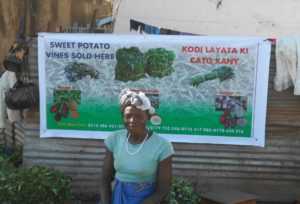
Lack of reliable seed systems where farmers can access clean planting material is among the major constraints to sweetpotato production. Most farmers get vines from the previous crop or from their neighbors. This is a risky system since it lacks a system for quality assurance and may lead to build up of systemic diseases and consequently decline in yield. There have been numerous efforts promoting the adoption of quality planting material for sweetpotato within sub-Saharan Africa. However, most farmers still rely on their previous crops or neighbors for planting material. Noting this challenge, the Sweetpotato Seed Systems and Crop Management Community of Practice (CoP) dedicated its 5th consultation meeting to marketing strategies for quality sweetpotato seed. The theme of the meeting held on May 10 – 12, 2016 in Arusha, Tanzania was ‘Marketing strategies for quality sweetpotato seed’. One of the objectives was to share experiences from the public and private sector on marketing strategies for quality seed. Participants brainstormed on methods that had been used by various projects and institutions to market sweetpotato seed. Some of the strategies that were identified as being successful included:
a) Use of vendor kiosks showcasing products – both roots and vines
This is an effective marketing strategy for sweetpotato seed since interested buyers can purchase vines while buying the roots. In case a buyer likes a certain root he or she can also buy its seed. This way a farmer is able to buy planting material based on preferred root characteristics. This approach can be improved by including more information e.g. brochures on good agronomic practices.

b) Using ICT to link actors along the value chain
ICT’s role in marketing is without question. Almost every company has to employ ICT in marketing lest some segments of the market be left out. Mobile phone technology is one of the game changers in marketing as it can now be used to also make payments. One of the presenters shared how they were using mobile phone technology to market sweetpotato planting material in Uganda. Stephen Kalule told participants that mobile phone communication was helping multipliers to harvest vines only after receiving orders from customers. Additionally, farmers are able to contact multipliers easily. Mobile phones can facilitate transactions using mobile money, which is convenient and cost-effective, and promotes saving among multipliers without bank accounts.
c)Use of local leaders as OFSP champions
Every community has people who are revered within the society. These individuals can influence the community’s perceptions towards a certain technology or product. Identifying such people and including them in awareness creation activities can boost adoption of quality planting material for sweetpotato, both OFSP and WFSP.
d)Use of audio-visual media
The mass media has always played a critical role in communicating pertinent issues affecting the society, agriculture included. Radio is particularly important given its wide reach. Almost every farmer has a radio which they listen to even while working at the farm. It can therefore be used as a tool to market sweetpotato planting material. Programs highlighting the importance of quality planting material can be aired and contacts of multipliers shared.

e) Use of a ‘pull’ approach
Participants at the meeting also suggested the use of a pull method whereby seed demand is driven by root demand. This is especially important for OFSP since farmers often cite limited root markets as one of the reasons for low adoption. Linking sweetpotato seed and root value chain actors can spur the demand for clean seed.
Adoption of clean planting material can boost sweetpotato productivity in SSA by reducing yield losses associated with systemic diseases. However, more efforts and investments are needed in marketing and awareness creation since most farmers are not used to buying sweetpotato seed. The methods described above are just a few of the approaches that can be used to increase use of quality planting material. The ever changing technological environment also presents an opportunity to identify/develop other novel approaches that can be tapped in marketing of sweetpotato seed.